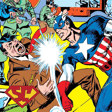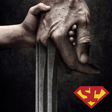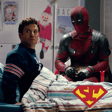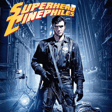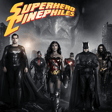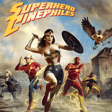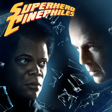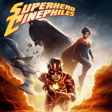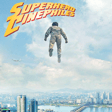Become a Creator today!Start creating today - Share your story with the world!
Start for free
00:00:00
00:00:01

Batman: Mask of the Phantasm
Adam Lance Garcia returns to discuss Batman: Mask of the Phantasm, which both he and Perry agree is one of the greatest Batman movies ever made. Adam is also the creator of The Green Lama superhero audio drama, which just completed its first season, and he and Perry talk a lot about the series and the background behind it.
---
Send in a voice message: https://anchor.fm/superherocinephiles/message
Recommended
Transcript
Introduction to Audible and the Podcast
00:00:00
Speaker
Hey, fellow superhero cenophiles. Did you know that almost 30% of adults say they haven't read a book in the past year? Primary reason why is a lack of time. Well, Audible's here to help with the gift of found time. Thanks to Audible, you can listen to audiobooks like Marvel Comics, The Untold Story, or Slugfest inside the epic 50-year battle between Marvel and DC.
00:00:19
Speaker
Read up on the history of superheroes in comics and movies with Grant Morrison's Supergods. You can also check out Vanguard, my original superhero novel series, or try The Vrilagenda or The Adventures of Fortune McCall, both of which were written by our duly departed host emeritus, Derek Ferguson.
00:00:35
Speaker
Whatever you're looking for, Audible has thousands of titles that you can consume while commuting, exercising, cooking, or just relaxing at home. And not only audiobooks, an Audible membership also gives you access to tons of content like podcasts, theatrical performances, and exclusive Audible originals that you won't find anywhere else. To give you a taste of what you can get, Audible is partnered with this show to provide listeners with a free 30-day trial.
00:00:59
Speaker
All you have to do is go to audibletrial.com slash SuperCinemapod and with your free trial you get one free audiobook and two free Audible Originals. In fact, you get to keep those titles even if you cancel before the trial is over. So what are you waiting for? Head on over to audibletrial.com slash SuperCinemapod and start your free trial today.
00:01:36
Speaker
It doesn't mean I don't care anymore. I don't want to let you down, honest, but... But it just doesn't hurt so bad anymore. You can understand that, can't you? Look, I can give money to the city. They can hire more cops. Let someone else take the risk. It's different now. Please. I need it to be different now.
00:02:07
Speaker
I know I made a promise, but I didn't see this coming. I didn't count on being happy. Please, tell me that it's okay. Maybe they already have. Maybe they sent me.
Meet Adam Lance Garcia
00:02:47
Speaker
Welcome to the Superhero Cinephiles podcast. I'm your host, Barry Constantine, and welcoming back probably the second most frequent guest on the show. Kellan Conley's got you beaten by one episode. So you got to have to work on that. But that's Adam Lance Garcia. Adam, how you doing? I'm doing so great. I'm happy to talk to you, man. I miss you. I miss you too, man. I miss you too. I don't know if Elena feels the same. She's just kind of like staring at the screen.
00:03:16
Speaker
But it's good to see you again.
The Green Llama Audio Drama
00:03:18
Speaker
And you got some good news happening lately. And that's the Green Llama audio drama. So let's talk a little bit about that. So it's the last episodes coming out of the season, right? The last episode is coming out on February, February. The last episode is coming out on February 11th this Friday. Okay, so by the time people listen to this, it'll already be out then. So definitely go check that out then.
00:03:41
Speaker
Yeah, it comes out on February 11. It is an hour long season finale of our eight episode first season. It is produced in Dolby Atmos, so it's like a very immersive experience, listen to it on your headphones, but it's a continuation, the whole season is a continuation of the novels that I've been writing for
00:04:01
Speaker
well over a decade. And it's really this great, wonderful passion project that I have been wearing my heart on my sleeve. It talks a little bit directly to our current state. And you can tell it's fiction because people stand up and do the right things at the right time. But it's, yeah, it's just this really grand experiment.
00:04:27
Speaker
of revisiting a character that I've known for a very, very long time that I've been writing for a very long time in a format that I absolutely love. The audio format is such a liberating way of telling stories because you're really just bound by the imagination of the audience. There's just one sequence in the seventh episode that
00:04:53
Speaker
I still think about it to this day. It's a very visual sequence, but because of the skill of my sound designer, Josh Wilson, it comes alive, you know, and the talent of my actors and my co-producer, Steel Philippak, just, I'm so lucky to have these amazing people around me because it's something that I really wanted to do years and years ago, and it's done.
00:05:18
Speaker
And that's nuts. And that's, it's probably the closest it'll ever do to a Marvel film, but it's, yeah, I could go on about it. I'm so excited about it. Well, let's go on a little bit, but let's back up a little bit. How did this come about?
00:05:35
Speaker
So I've been running the Green Llama under license for about a decade, primarily through Moonstone Books. The Green Llama, for those who don't know, is a Buddhist superhero from the 1940s. My father collected him, at least the original comics from Spark Publications. The Green Llama was in Popes, he was in comics, and he had a radio show. And something that I decided very early on in my career with writing the Green Llama was that
00:06:05
Speaker
I wanted to do a match or exceed the Kendall Foster Cross and the creator's resume. He wrote 14 stories. So my goal is to maybe not write 14 stories, but at least beat the word count of the stories he wrote. And he did a radio show. And I figured I wanted to do a radio show. And I wanted to do it in such a way that spoke to both
00:06:32
Speaker
fans of the series, people who are, who knew the Pope's, who read the Pope's book, both back in the day and the current ones, but also to something that sort of spoke to modern listeners, to a modern audience, and sort of hogging that balance between the two.
00:06:50
Speaker
So I have been producing audio dramas with my co-producer Steel Philip back. We were thinking about doing another season of audio dramas for our company called Radio Room. And I was like, well, what about the Green Llama? Like, I would love to do this. I've always wanted to do an audio drama.
00:07:06
Speaker
And we came up with a story, sort of a legacy generational story. And over the course of the pandemic, basically, right before the pandemic, we wrote it. And during the course of the pandemic, we produced it all, basically, almost completely remote. We cast some of our regulars, like Jean-Marco Soressi as Jethro Dumont, Green Llama, Sarah Smithson as the riveter, a new superhero that we introduced in the series.
00:07:35
Speaker
Deanna Ebert as Emighol Stewart Brown, Justin Torres as John Carraway. A lot of returning characters like Ken Clayton comes back, played by Mark Bradley Miller. A fun little thing is a character named Ben Mendoza, who was named after a friend of mine, Ben Mendoza, was played by my friend, Ben Mendoza. So it was over the course of,
00:08:01
Speaker
many, many months, we put together some really great stories with a really great cast. We have an amazing composer named Brian Metolias, who I cannot speak highly enough of. We gave him a very, very specific brief when we created the theme song.
00:08:20
Speaker
And this sort of like encapsulate our approach to the whole series is, you know, we didn't want it to just be, we didn't want to recreate a 1940s, a 1940s radio drama. Like every time you try to recreate something, the line is so thin of homage and parody, especially with an audio drama because
00:08:42
Speaker
you could have everyone like, and that's what we're going to do this time, bringing llama. And yet that might be true for what happened back then, but we're not back in the 40s. It's not going to read the same way. We use two touchstones, and that was Indiana Jones and Batman the Animated Series. And with Indiana Jones, it was like Lucas and Spielberg,
00:09:05
Speaker
wanted to create a movie that felt like the movie serials they grew up with. And they boiled that down and created something that spoke to a modern audience, but also like evoked the feeling
00:09:19
Speaker
of these genres, of these old movie serials. And Batman the End made series, it's like, it's a very distillation that takes itself very seriously, a very serious version of Batman while still having fun and still like sort of being sort of amorphous and speaking to this classic feel and this more modern feel and sort of that really interesting balance. So we said that to Brian, we're like, when some of that evokes the film,
00:09:45
Speaker
feel of the original Green Llama radio drama, but speaks, you know, makes it feel action and kinetic. And the man did the theme in one go and it's the theme that we use now. It was just perfect. And he and Josh Wilson, my sound designer, I think I give all the credit to them for making this series work.
00:10:13
Speaker
I, the B-level scripts, like my scripts are good, they're fine, but the combination of my actors, my director, Steele, Brian, making the music and giving that emotion and Josh just feeling out the world, it made this something successful. I really can't take all the credit for this one because it's, you know, it's such a wonderful collaboration.
00:10:39
Speaker
I'll murder all these people's enemies for them. Wonderful humans. Well, hopefully they don't have a whole lot then. We don't want you to get too long. Oh, I don't care. But anyway, what I wanted to ask you is, you mentioned that your dad was, you had been a fan of this. So were you kind of like, did you kind of like grow up with the Green Llama type of thing? Because I know I was like that with my dad and James Bond and Indiana Jones, like he was a fan of them. So I kind of grew up watching them.
00:11:09
Speaker
I was a, I would never describe myself as a fan of the Green Llama growing up. I was aware of it, aware of him. So my dad loved collecting sort of esoteric heroes. He liked the weird superheroes, the sort of like where a lot of comic collectors went after like the big names, the big like number ones. And while he did have those, the things that he really enjoyed were the weird superheroes like Attoman and Golden Lad and the Green Llama.
00:11:39
Speaker
So I remember him very, very vividly showing me a comic, the Green Llama comic, when I was watching Star Wars, The Phantom Menace, because he's like, oh, look Padme, like in the Green Llama. So when I was approached by a publisher years ago, and there was a list of characters that they wanted to play with, the Green Llama was on him on that list. And I said, well, I could write this from a real place. There was a lot of characters that I never really heard of, I didn't really know, but I knew who the Green Llama was.
00:12:08
Speaker
If I'm writing this for my dad, something that he could he could have read and enjoyed, then I'm writing it from a more sincere place. Yeah.
Adam's Personal Connection to Green Llama
00:12:18
Speaker
What I didn't expect when I wrote the first story horror and clay was that I would fall in love with the character. I wouldn't I didn't expect to.
00:12:28
Speaker
really be engaged with his story and wanting to keep on telling the next adventure, the next adventure, the next adventure. You know, I've written, I think about 10 stories with him now. I'm on my 10th story. That's not including the eight episodes of the audio drama. I've done a comic, Quick Stand Alone, and I really
00:12:48
Speaker
I mean, to an even bigger degree, like the woman I've been with for the last decade, we met because of a Green Llama performance at the Reuben Museum. So the llama is a huge part of my life, but it was because my dad collected the comics. And I just wanted to write something that could be for him. And this season is dedicated to his memory.
00:13:12
Speaker
Oh, I'm sorry. I didn't I didn't know he passed away. I'm sorry about that. Yeah, he passed away a year ago in about 10 days, I think about a year ago in February. So though he's he unfortunately did not hear this season. But I think a lot of a lot of the messages and a lot of the
00:13:38
Speaker
like the way he viewed the world is infused into this series. This idea that like doing good and like being kind and helping people, like there's a lot of my dad in these stories. So while he'll never have listened to it, he's in it in every single way. Yeah. Yeah. Well, that's sweet. So you said that a publisher had approached you about it though. So how did that end up happening?
00:14:07
Speaker
So I was at the was 2008. I think it was 2007 2008 I can't remember what anymore, which one anymore. I was near Comic Con. And I had had a self published comic called Nick agent security guard which was a
00:14:24
Speaker
a comic book adaptation of a short film I directed in college. Basically, what if Dirty Harry was the security guard of the gap? And it was very much this like, here's my comic, sort of like proof of concept of being like, I can write something. And the publisher came by, I am a shameless self promoter.
00:14:45
Speaker
And I was like, here's my comic. And he liked it well enough, reached out and we, he gave me a list of characters that you were looking at. And I was like, Oh, I look in Green Llama, I'll do it. Okay. You know, I think that's the biggest thing that a lot of young writers always kind of lose sight of. It's like, if you really want to be a writer, like you have to put yourself out there. And that was
00:15:07
Speaker
You know, while writing isn't what pays the bills yet, it's something I've been doing professionally for over a decade because I put myself out there. Right. Yeah. Yeah. And you said that you had fallen in love with the characters. So because, you know, I've seen those lists from publishers of the the pulp characters and just like
00:15:27
Speaker
going through them and going through their stories and everything. After a while, your eyes kind of glaze over because they were just kind of pumping these things out back in the day. Yeah. What was it when you started writing the Green Llama that really made him appeal to you?
00:15:43
Speaker
Um, I mean, there's this, it's a lot of different things. Um, one thing that stands out is his supporting cast is really interesting. Um, you know, and I was kind of, I, how I read them in the original pulps, I like Jean Farrell is just this red headed, um,
00:16:03
Speaker
You know, she's first Montana girl. I just I fell in love with her. I liked writing her. Ken Clayton, who is her best friend and who I read as as gay in the story and made him canonically gay in my stories. He was a really fun character to write. But what with the Lama himself?
00:16:25
Speaker
I liked his view on the world. A lot of pulp characters of his era, like the spider or even the shadow were very violent and saw the world in very black and whites. And I think the Buddhist aspect made him sort of come from a much more kinder place. He's there to something that we talk about a lot in the audio drama and
00:16:55
Speaker
in the novels is he wants to be a bodhisattva, which is this idea of leading by example, this idea that you're delaying your own enlightenment so that way others can find enlightenment based on your example.
00:17:13
Speaker
And I like that. I like this idea that here's this person who saw children murdered. And he is like, I need to, I need to stop this. I need to help people. I need to find a way to lead by example. And some of that wasn't necessarily in the the pulps. The original pulps was something that definitely came out from my own writing with him, my own research of
00:17:35
Speaker
of Buddhism and working with the licensor of the state, of the state, Kendra Cross and Burroughs, who is the creator's daughter, helping me sort of learn about the Buddhism. I just, I don't know, there's this idea that, and there's a scene in this, in the, in the audio drama that I think kind of exemplifies it. And this is the season finale, spoilers if you haven't listened to it.
00:18:02
Speaker
but basically the city rises up to
00:18:07
Speaker
stand up against fascism against is basically what is essentially an alt-right movement. And, you know, the villain is like, what's happening? Who are these people? And it's like, the lama isn't a person, he's an ideal. And this, I think that we're striving towards being. And I like this idea, it's very much a Superman idea.
00:18:35
Speaker
It's very much this and Perry, you and I have talked a lot about Superman offline and like what we, what appeals to that, what we find appealing in that character is this idea of like, just being good for good sake. And it's not like, it's not vengeance as much as we love Batman. And I know we're going to talk about Batman. Like it's not about vengeance. It's not about like this black and white idea of justice, like the spider. It is this idea that like, I just,
00:19:05
Speaker
want to help people. And again, I think, you know, is all of that necessarily in the original pulps? Debatable. But that was my reading of him in the pulps and whether that was between the lions,
00:19:21
Speaker
I mean, I found it. I just, again, it's someone who's driven by their faith. And that's really, that's really interesting. That's a really interesting take as opposed to like, I'm going to be justice because there are bad people out there. This was someone who was like, my faith dictates me to help others and fight crime. And that was really a new aspect, a new idea. The Buddhism aspect is something I wanted to talk about too, because the- Yeah.
Cultural Themes in Green Llama
00:19:50
Speaker
When it comes to using like Eastern religions, spirituality, anything like that in these types of characters, there tends to be two tracks that most people take. One is just, we know the bare minimum and we just kind of like skim the surface and then just go with the woo woo type of it's, you know, Eastern magic type of thing, which I know you don't do. And then the other approach is like, you know,
00:20:16
Speaker
Grant Morrison really deep dive knows a lot about it and you're going to find out and you're going to see all these esoteric concepts and the guy knows them inside and out. And you said that the creator's daughter helped you out a lot with that. So was he someone who was really into Buddhism?
00:20:37
Speaker
Boy, I, I think enough that like he did enough research. You know, there's a lot of what was always interesting talking to Kendra about some of the, one of the big debates Kendra and I would have about certain words and how they're spelled, for example, like I would, I was always writing Omani Padme Hum, the same way
00:21:01
Speaker
Ken Crossen wrote them in the original. So I'm like, well, that's what how he wrote it. And that's how I'm going to write it. You know, I'm going to respect what the creator did. But she said, like, that's not how you write it. That's incorrect. We should do it this way. So we found like a nice medium.
00:21:18
Speaker
So, you know, to the two examples that you gave, I'm sort of in between. I definitely I do not have a encyclopedic knowledge of Buddhism. I would never claim to that. But, you know, there's ideas and concepts that through my discussions with Kendra, with whatever little research I've done,
00:21:39
Speaker
that adds to that vermilitude of the Eastern faith while also acknowledging like this is a white character who is Buddhist. It's, you know, it's of the era.
00:21:51
Speaker
Um, to that specific point, like that was a conversation I had with someone online, like, well, why didn't you, uh, recast him? Like, why is he, you know, why is he still a white man? Um, and part of it was because that was, I was tasked, um, by my publisher, like to set it in the era of the original comics of original pulps. And Jethro Dumont is.
00:22:15
Speaker
the Green Llama. Right. It also kind of works for the time because you have Dios Bernard, who was the White Llama, who is someone who went to Tibet. He spent an amount of time in Tibet and brought Buddhism to America. He's one of the main inspirations for the Green Llama. He's a real man. There's a couple of books, I think. One is called The White Llama. His book is called... Oh, man.
00:22:39
Speaker
I think it's like clouds in the sky. I have to look it up. I can't remember the exact name of it, but there was an, he wrote about his experiences.
00:22:48
Speaker
So, you know, it does fit for the era, but like if I were to like create the Green Llama today, I'd probably have him actually be a Tibetan person, whether that be male or female really depends on the story because I establish that the Green Llama doesn't need to be a man to be a hero. That's an, spoilers for Crimson Circle, Jean Farrell becomes the Green Llama. So yeah, I know it's so, no, it's okay.
00:23:18
Speaker
She saw my phone, so she likes. She wants to hold it, yeah. Because you look at it and then she looks at it, yeah. It's also got her picture as the screensaver, so she loves looking at her picture. Who doesn't? She's so cute.
00:23:35
Speaker
Um, so you're quite like, yeah, it's, it's this mix of like making sure that what Buddhism I include is true, uh, for the faith that never comes off as woo woo, like, um, Orientalism, like as it was back in the day. Um, you know, it, that it's, you know, I, that again, that it's true Buddhism that, uh, but never really dives deep into the minutia of it because
00:24:06
Speaker
I think if I dive too deep into it, I, as a writer, I would want to do more research so it becomes true, but also it's secondary to like, it's the core of the story, but like it's the core of the character, but it's not the core of the story. You know, these are still adventure yarns. So it's a weird balance. I'm something I'm always mindful of.
Green Llama's Audience Appeal
00:24:31
Speaker
And one final thing about the audio drama, and then we're gonna move into the movie discussion for today, but how's the response been? It's been really good. You know, it's an indie, so, you know, we're getting maybe about like two to 300 people listening per episode across two different platforms. We're on like Apple Podcast and Spotify and Audible, but we have it. This is a standalone Green Llama,
00:24:58
Speaker
series and the radio room sort of core podcast. The response has been overwhelmingly positive. And it's been really, really validating. And you and I have talked about this before, but with Pulp, it's very hard to break outside of a very niche audience.
00:25:24
Speaker
you know, the way, both in the way that we produce it, the way that we've written it, you know, we've written with new listeners in mind while still speaking, like keeping it true to what made the character, you know, beloved before we, I took him over. You know, I've seen like one response that like, I've been really respect, something to the perspective, like I've respected what's the original source material while not being bound by it.
00:25:53
Speaker
You know, a lot of people who have just, who are Green Llama fans are just like, it's just great to have the Green Llama back. And it's so nice to hear these really big adventures. And people have never listened to or read their Green Llama before. They've all been impressed by the scale of it and the production value of it. You know, I, again, I can't take, you know, even though I'm the producer of the series,
00:26:19
Speaker
You know, the thing about, and I've already mentioned this before, but the thing about collaborative media is like audio dramas, like films, like anything, like you're only as good as the people you surround yourself with. And the team I have is just phenomenal. Yeah, so the response has been great and you know,
00:26:47
Speaker
It's been so good that like, we can probably talk, we can showcase it. But again, the response is so good because of Josh Wilson, because of Brian Motolius, because of Steel Philippak, John Marcos Cerussi, Sarah Smithton, Mark Bradley Miller, Dana Ira, Justin Torres, Scott Thomas, Maggie Lovett, Ben Mendoza, Mustafa Boonani, Alex Polin, Jack Bacone,
00:27:14
Speaker
just Patrick Willems, who appears in the last episode, you know, oh, and of course Brett Truck, I have to talk about Brett Truck, who's the main villain. These people that I surrounded myself with, you know, created something that I don't know if it'll win awards and it'd be cool if it did, but
00:27:35
Speaker
I'm so, so proud of the series, Perry. I'm proud of it, but the fact that people have seemed to really fall, have really enjoyed it, has been so just the coolest thing in the world. I mean, you know, like with your own writing, when someone actually really loves your writing, you're like, oh wow, this is really exciting, this is really validating and awesome.
00:28:03
Speaker
Yeah, it's the response has been everything I hoped for it. Sorry, she was interrupting there. But one other thing I want to ask, so how many, how many Green Llama books have you got out so far now? So I always forget because there's so many.
Green Llama Series Overview
00:28:22
Speaker
I have two full length novels, Green Llama Unbound and Green Llama Crimson Circle. And then I have,
00:28:32
Speaker
three novellas, green llama scions and Sherlock Holmes and the green llama, the heir apparent.
00:28:44
Speaker
Then I have a bunch of short stories that I've written in crossovers, like with the black bat, with operator, it was supposed to be operator five as someone else, and sort of like 10 gentle crossovers that are secret if you don't know to look for them, like foster fade, there's a crossover in there, and a domino lady crossover, that's not a,
00:29:13
Speaker
the sort of secondary characters all kind of crossover. So yeah, so the short answer is I have got two novels, Unbound and Crimson Circle, three novellas, Har and Clay, Sions, and a Sherlock Holmes crossover, Air Apparent, and I'm working on the third full length novel, Redemption, which will sort of close out the trilogy of novels and sort of close out the entire era.
00:29:42
Speaker
of the Pope sort of print novels that I've been doing. So, and now say I'm someone who thinks, oh, wow, you know, I like audio dramas. This sounds pretty cool. I want to listen to this. I don't want to read. I don't want to read two full length novels and three delas and all these. Yeah. How would you do that? Yeah. So how like, I don't want to read. What is this? Reading? Who reading? Reading what my grandpa did.
00:30:09
Speaker
So say that, I know nobody here in our audience does is like that, but say there is, you know, would they need to read any of this stuff in order to enjoy the audio drama? No, the audio drama is written specifically with new listeners in mind. We have a whole new status quo. The Green Llama comes back from fighting in World War II, so he's been gone for a while. But it is set up in a very specific way that if you've never read a Green Llama before, you
00:30:38
Speaker
don't have to worry about learning anything. Everything's set up in that first episode. But if you're an old school fan and you've either read my novels or you've just read the original pulps, there's a lot of Easter eggs that will reward you for having done that work. They add flavor and nuance to his universe, but they're secondary little nuggets. They're little literal Easter eggs.
00:31:08
Speaker
So kind of like thinking about Mandalorian and how they got references to stuff that happens in like the Clone Wars stuff and the animated series. But if you haven't seen those things like me, you're not going to be lost. Exactly. A good example is, you know. In the very first episode, we introduce Emighol Stewart Brown, who is
00:31:32
Speaker
Excuse me, Evelyn Sue Brown who's a character from the original popes, and to sort of set up the entire world, we used to have a character, say like, Oh, you're emigle Stuart Brown, weren't like weren't you even involved with that big Crimson hand business back in the day.
00:31:51
Speaker
And that is just letting you know, this is who the character is. She was involved with the Green Lamas at some point. There was a Crimson Hand thing. It sort of sets up, there's a backstory. But if you've never read those, it doesn't mean, it's just like, oh, she's had adventures before. But if you know, then you know that that is the very first published Green Llama novel.
00:32:14
Speaker
period. And then there's even deeper cuts where, within the canon of the original popes, Kendall Foster-Crossin's pseudonym, Richard Foster, was a character in the books. And it's established in the original popes that Richard Foster was writing the popes. And so the popes were set in universe.
00:32:41
Speaker
So that actually is a big aspect of the series where, again, you don't need to know this because we do the groundwork within the audio drama to set up that like these pulps were something that existed, that the llama was using them to hide in plain sight. And they helped inspire this new character the Riveter.
00:33:00
Speaker
But again, if you know this, if you've read the original stories, it's just a bit of that payoff. It doesn't matter that you haven't read them. You know, there's always little things here and there that like, it's implied that the villain of the series is connected to one of my novels, but we never expressly say it because it doesn't matter. I think that's a big thing. To your point with The Mandalorian, it's like,
00:33:24
Speaker
if you know it's rewarding, but as long as it makes sense to the story, that's what really matters. And that was always my focus with the audio dramas, like it doesn't matter. I don't need to give the entire backstory to these things because the fans know that the fans know. I just need to make sure that it's true and real for the story that we're telling.
Accessibility of Green Llama
00:33:48
Speaker
Right, right. Okay, cool. And where can people go find it?
00:33:52
Speaker
They can find the Green Llama on our podcast, Spotify, Audible, really any podcast that you use. Just Green Llama with one L. By the time you're listening to this, all eight episodes will be out. Most episodes run about 30 to 38 minutes with the finale being an hour and three minutes and nine seconds long. Also, it has a post-credit sequence because
00:34:16
Speaker
I had to. I had to. It's it is very when I say that I felt like both like really excited and slightly dirty when I did it. It's just like this is it's like I'm doing everything I complained about with Marvel and I was like
00:34:33
Speaker
but this sets up everything. Not only does it set up everything for the next season, but it ties everything together. My biggest proudest moment of this season is that the first four episodes are...
00:34:48
Speaker
soft serialization. And then they started to become very serialized in the last, the back four, but the last episode has everything tied together in a way that I didn't know if I could do. And that, but it all kind of comes together in that goddamn postcard sequence that one scene, like everything matters. It's just like, it's, I just got to say as someone who, who for years has seen like your little Marvel critiques, just been like, ah, there he goes again. Yeah. This is just like, I love this moment right now.
00:35:18
Speaker
It was it was totally like I knew what I was doing and I was like I had to it's um oh man uh and and you feel free to cut this but like basically no no no this is staying in this is like the
00:35:33
Speaker
So basically in the season finale, you know, like there's like the basic thrust of the entire season that there's this unknown mastermind who started a gang war between two rival gangs and it's causing the city to sort of, you know,
00:35:52
Speaker
go into chaos and there's a bombing and assassination. And then it's eventually revealed that one of their allies is actually this mastermind, this sort of alt right mastermind who says like, you know, that people are, you know, we're doing a bulwark against communism and, you know, people are trying to go above their station.
00:36:15
Speaker
And in the finale, there's all these characters that you've met throughout the entire season play a role in fighting against the fascists. And then we, so we have this like sort of a prologue scene that establishes where these, like this one character is, we like the two warring families, they're making peace. It ties in episode three. And then, you know, they see the events of the previous episode and brings them in. And then we have our,
00:36:44
Speaker
our caraway, the commissioner of police, basically go to these criminals and like look.
00:36:49
Speaker
you know, I need your help to fight fascism. And they all help. So the cops and the gangsters and people of New York all rise up to fight fascism. It's very much inspired by that scene in the Rocketeer. I was going to say, that's exactly what I was thinking of. Yeah. Yeah, it's exactly the same. I mean, I make it honest living, but I'm still an American.
00:37:17
Speaker
Exactly. It's a hundred percent inspired by that. But like it's this big like sort of, it is inspired by it. You're going to laugh. It's very much the end game moment when like all the characters. Oh man, I just love it so much right now. I know you're appreciating it. I know you did. I might've made a mistake coming in.
00:37:43
Speaker
But it's inspired by Endgame and Rise of Skywalker. And with Rise of Skywalker, it's like, how do I actually make this work? But it's like, how do I have all these people show up? But it's very much Endgame where you have all these characters that you've, not every single character, but a lot of the characters that you've met throughout the season show up and they're like, we're gonna stand up against the bad guys.
00:38:08
Speaker
And then the post-credits sequence, everything is better and the criminals are like, to a new world daughter. And then the villain from the second episode, who you haven't seen since the second episode, shows up and it's like,
00:38:23
Speaker
Basically, it sets up the new status quo that this thing that they did to save New York created a power vacuum and now the bad guys have this new alliance that's going to cause more trouble for all the heroes.
00:38:39
Speaker
Um, so it's like, it's, it's everything I hate about the green law, uh, uh, uh, uh, uh, uh, the, uh, the Marvel cinematic universe. But like the thing that I think sets it apart and we can debate this and this is going to be another conversation from another time is that it's a post-credits sequence that actively takes all the elements of what's come before.
00:38:59
Speaker
brings them together and then sets up the next stage. It doesn't feel like a good example. It's like with the one that comes to mind, like with Captain Marvel, it's like, here's a scene from another movie and then, oh, here Captain Marvel shows up. It is very much, or like it's like, here's a little in joke from the thing that we saw before, or let's go kill Hawkeye for some reason. This is very much like,
00:39:27
Speaker
It, you saw all these things, you saw all these elements. How do I make it pay off? How do I yes and everything? And that last little nugget, it's, it's, I get chills thinking about it because it's a combination of like both. So Steele, who's my co-producer, who I mentioned, Ed Nauseam, he also plays the villain. He has this really great, it's one goddamn line. And it's like, it's chilling. And then the music that Brian did at that, like for that one moment, it's like,
00:39:56
Speaker
Like, oh, no, things are about the the shit's about to hit the fan. And it's like it's it. But again, it's like all that sort of it all comes there.
00:40:07
Speaker
I think it's kind of obvious and I'm very excited about this series. I think it's really cool. I'm really like, if you get a chance to listen to it, and this is you specifically, Barry, like if you get a chance to listen to it, I'd love to hear your thoughts on it because it's such a interesting medium, but it's also like, it's all the things I think we try to talk about like offline and online in a conversation like this. It's like the stuff that we like about the Marvel Cinematic Universe stuff. I don't like avoiding the stuff that I don't like about the Marvel Cinematic Universe, but also like how do we make hope
00:40:39
Speaker
how to make Pope something that someone... Yes. I got it on here. I haven't listened to it yet, but I have downloaded it, so. I appreciate you, sir. It does all these different things. And there are some episodes that are stronger than others. That's true of everything. But yeah.
Discussion on Batman: Mask of the Phantasm
00:40:59
Speaker
And I'm being verbose because the reason we're here to talk is about Batman. Yes. And so that's... In fact, this has actually been...
00:41:07
Speaker
a funny, coincidental thing happened because I got you coming on to talk about, you know, like, okay, well, you know, let's talk about Batman, Master the Phantasm. And then, um, last episode, we had Stacey Dukes come on. He's like, I want to talk about Batman, Soul of the Dragon. And the next episode, we've got, uh, Demond Thompson, who's like, I want to talk about, you know, Batman Beyond Return of the Joker. So we've got a triple feature Batman. Yeah. Coincidentally, it all seemed that. The Joker's great.
00:41:31
Speaker
That's a good one. So I'm almost not talking about it. But at the same time, Mask of Phantasm is amazing. Well, he's he booked that one. He asked requested that one months in advance. So you would have been so well with that. But anyway, Mask of the Phantasm like, yeah, this for my money, like Dark Knight is amazing and all that. But as far as I'm concerned, this is the greatest Batman movie ever made.
00:42:00
Speaker
I can't debate you on that. I literally rewatched it just before we started recording. I finished it a minute before we started the Zoom call.
00:42:16
Speaker
It's it is so efficient in its storytelling. There's absolutely no meat. No fat on this story. It's all meat. It's lean. It's tight. It does. It introduces new ideas into the Batman canon. But yeah, it's it's up there, dude. I really can't fight you on this one.
00:42:38
Speaker
Yeah, I mean this is, and this is a movie like Derek and I would always kind of talk about this in the abstract because he also agreed this was like the best Batman movie I've ever made.
00:42:48
Speaker
And you had mentioned that, and I had actually just bought it recently because I was back in the States, had a bunch of hidden up DVD shops and found this there, like, you know, on sale for like three bucks at a huge DVD store. And I'm like, how am I not going to buy this? And it's kind of surprising, because I didn't realize that I did not own it. I owned it back on VHS way back in the day, but I never picked up the DVD for whatever reason. And
00:43:13
Speaker
And, you know, rewatch, and as soon as I got home, like that was like the first thing I watched was this movie. And, you know, rewatch it again after, it had to have been like at least 10 years since the last time I saw it. Every time I watch it, I'm blown away again by how good it is. It's, you know, I had that sort of, that same reaction watching it today where it's like, it just dives right in. And that is,
00:43:38
Speaker
you know, something that I've really missed in a lot of the superhero content that we get today. You know, there's all this world building, all this like a larger cinematic universe, like all these different things they have to sort of like, there's all these different things they have to do to sort of like justify this thing's existence.
00:44:00
Speaker
you know, even like Dark Knight, which is again, which is great. It's, there's a bit of fat on that, like, you know, and it's a very lean movie, but like this move, Masked with Antism, you jump in and Batman's Batman. He's doing a Batman thing. And then like two minutes in, the villain shows up. Yeah. And it's like, and you understand exactly what's going on. You understand like this person looks like they think it's Batman and he's killing somebody.
00:44:25
Speaker
And you understand within the first maybe five minutes what the story is about. Like you understand who the antagonist is. You understand what that means for Batman. You understand what that means for like Gotham as a whole. And then like when they start adding the love story to it and the use of flashbacks or it's just, it's brilliant. I mean, it is suck.
00:44:55
Speaker
even setting aside it being a great Batman movie. It's just a really effective and efficient story. And it's, yeah, I miss stories like that. It's also like, it's under like, it's an hour and like 13 minutes. Yeah, it's 80 minutes. Yeah, it's. 80 minutes. And that's something that I've come to appreciate about the, because a lot of it is, I understand at least a lot of the later movies that they intentionally forced them into that short timeframe, because the idea was,
00:45:23
Speaker
when a lot of this stuff would be airing on Cartoon Network, they'd split it up into like, you know, into like, so it had to be split up into these parts to fit into the, whatever the time block it was. And I'm not sure if that was also the case with this, or if they had also had that same thing in mind, but it does have that same very short runtime. And it just, you know, it just moves really quickly. And they tell, there's a lot of story in 80 minutes.
00:45:52
Speaker
Yeah, yeah, I mean, like the whole love story between him and Andrea, the idea, like the revelation, non-revelation of who the Joker is, the, you know, just the main thrust of the phantasm. There's a lot, there's like at least three plot stories that all converge in the end and just, oh God,
00:46:23
Speaker
It's just if it like I'm going to review myself. It's so efficient storytelling. It's just man. Not like not a wasted moment. No, I'm not sure. Did you watch this back in the day when you were a kid? Because I remember I saw in theaters. Yeah, I can't remember if I saw it in the theaters or not. But I do remember seeing the videotape at like, you know,
00:46:44
Speaker
a drugstore, I think, of all places, and just being like, I gotta buy this. Because I love the animated series. That was like back, when it first came out, it was a daily show. So it was like every day, I'm home from school. I was right in front of the TV watching Batman. That's a great series. And this series, this, like, I'd seen 89 Batman, but I think this series really, I'd seen 89 Batman, and this came out, I think, after Batman Returns, if I'm remembering correctly. I think so, yeah.
00:47:12
Speaker
So yeah, I'd seen Batman, Batman Returns, and then I became, and it was really this series that really kind of cemented that Batman love for me. If not for that, I think, you know, like all kids, you know, you see something, you get obsessed with it for like three months and then you move on to something else. I think if not for this series, I probably would not have been as in love with Batman as I am today.
00:47:36
Speaker
Yeah, because I think it's just the series and in this movie just understood Batman and and made it him and his universe accessible to all ages. And I mean, that's and I feel like today the term all ages gets a little
00:47:55
Speaker
I poo poo'd upon in some ways. Cause I think a lot of people think like all ages means like, well, it's intended for children. But I think, you know, this series exemplifies like how you can tell a story that's really good for kids, but also has these darker and more nuanced themes. You know, and like, I remember this movie singing like, oh my God, he's bleeding. That's something they couldn't do on TV, but they could do it in the theater.
00:48:24
Speaker
you know, it's, yeah, I think it's, it's also the style, the style of the show and the movie itself is so unique, this idea that it's set in the modern day, but it has like a fifties, forties feel, was a really good choice. I think
00:48:48
Speaker
or down to even world's fairs still happen. As a kid, you didn't notice that, but as an adult, we watched this and like a world's fair. When was the last time we had one of those? Yeah. It's just like everything about it. I think this, you know, there's a lot of
00:49:07
Speaker
Batman, a lot of superhero stories that don't always, especially when it comes to like an adaptation, like a Batman in the animated series, that don't really hold up the more you revisit them. And part of that is because of when the eras they're set. There have been a lot of Batman,
00:49:31
Speaker
movie TV shows since the animated series, but we don't talk about them the same way that we talk about the anime about right. Mask of Phantasm in the animated series. And part of that is the way they decided to have a timelessness to it.
00:49:47
Speaker
The fact that you can't pin down when it takes place. It's always today. Because it's always yesterday. Whereas, I think a lot of like, there's like that CGI animated one. Oh, yeah. Be one of the Batman.
00:50:03
Speaker
right before the Batman and there was a few other ones that felt very like of the era. They felt like the 90s and early 2000s. They spoke to that specific audience. Whereas Batman, the animated series was like, what is Batman? How do we boil this down? How do we distill it and make it true for everybody who's watching it? So yeah, it's,
00:50:30
Speaker
There's a reason why we keep on going back to it because it's always, always, always going to be.
00:50:36
Speaker
Today, it's always something that we're watching right now. It never feels out of place in time in a way that I think, you know, even the Dark Knight is going, as much as we love it, it's going to eventually be because it's of a very specific time. I'm really kind of curious to see what Matt Reeves Batman's gonna be like because it looks like very modern, but also not. And, you know, how is that going to hold up? I think the Batman 89,
00:51:04
Speaker
uh the nostalgia that we have around it uh part of the reason why it that that version of batman and 89 and returns holds up is because
00:51:15
Speaker
important to his credit was like, let me just set this in Gotham. It's just Gotham. It's not it's not today. It's not yesterday. It is Gotham City. Whereas you have, you know, that begins that the Dark Knight trilogy is always going to be set very modern. Yeah. Yeah. And let's set about the Snyder versus the better. Yeah. Well, talking about the Dark Knight, that's one of the things that kind of struck me is rewatch. First time I watched it, I was blown away. But
00:51:43
Speaker
on subsequent viewings, like I can't remember the last time I saw it, but whenever the last time I saw it was probably like last year or two years ago, it felt a lot slower than I remember. And it just, I think a lot of it was just like the novelty of Heath Ledger's Joker and all that, and seeing all that at the time, that kind of novelty is gone now. And so it doesn't have the same shine it used to have.
00:52:13
Speaker
Whereas, and I think going back to what you said about the timeless thing, and since I've been doing art, I'm paying a lot more attention to this stuff. And I mean, one of the genius things about what Bruce Timm and his team did was not only like the aesthetics, right? So it's got like these 1940s, you know,
00:52:31
Speaker
buildings and like the art deco type of stuff mixed with like more modern cars and modern technology. But just the character designs too. It's just like they've got a very, and like you were talking about the, you know, like the, the Batman, those, those Jeff Matsuda designs, which are, you know, amazing, don't get me wrong, but it's very much of that time period. Like you were saying, it's very much that kind of art aesthetic that was being done in a lot of animated series, like the Jackie Chan adventures and all that kind of stuff. Yeah.
00:53:01
Speaker
or like you said, the Beware of the Batman with the CGI influences. Whereas Bruce Timm's style, it's very much influence. It's got that classic influence in it, right? So it's got, he's very much influenced by the Max Fleischer Superman serials or by Jack Kirby. And so you've got that very timeless kind of feel mixed with this, but it's so smooth, right? That's one of the things that strikes me rewatching the animated series compared to
00:53:30
Speaker
say X-Men or Spider-Man is like the animation in those shows. As much as I loved them at the time, it's just the animation was very, very clunky. Whereas this, it's just...
00:53:43
Speaker
it flows just as smooth today as it did back then. And like, there's no, when you watch Batman the Animate series, you're not watching it because of nostalgia. Like you could give this, if you give X-Men to someone now, they'd probably be looking at you, really, this? Because a lot of it is,
00:54:00
Speaker
you know, it was a groundbreaking at the time, but now it doesn't really hold up because it's mostly that nostalgia factor that keeps us attached to it. You can give them in the animated series or Master the Phantasm to someone today, and they would not have a problem. They would be totally into it.
00:54:19
Speaker
Yeah. And again, it's like the style of it is the reason why it's so smooth is that they probably spent less time having to draw the characters. You look at something like X-Men, there's a lot of detail in the way those characters are drawn. That was kind of the style of the time you look at shows like Exo Squad or even like
00:54:40
Speaker
Mighty Max shows that I watch pretty on the regular. Like they had a lot more detail in the characters. So they weren't always stiff, but it's a very, it's a very of the era look, but with, you know, with Batman, like, because it's all like lines, it's all like squares and like, it's very boiled down. Again, the idea of boiling things down is whenever I think of Batman, the anime series, I think of boiling down. I think it's like,
00:55:09
Speaker
Roost Ham, Alan Burnett, Paul Dini, everyone involved with that show was like,
00:55:14
Speaker
how do we strip this back in every single way? So we just get right to the core of it. And they use those shapes to like, what does Batman, what's the shape of Batman? What's the shape of the Joker? What's the shape of the penguin? So that makes the animation smoother because they're just able to like, all right, here's the shape. But then it boils down to this, you know, how those characters are portrayed.
00:55:41
Speaker
uh in the writing and the world building um yeah i i really like that is something i think that marvel does very well is that then i'm like how do you like in terms of the way those characters are written like how do you boil down the essence of these characters you know i think uh
00:56:01
Speaker
they succeed to varying degrees, but like the reason why the Captain America series is really well, and the reason why Spider-Man did really well, because they're like, what is the pure essence of these characters? And I think that all really began with the Batman and the Animate series. Yeah, and I'm not sure if this is intentional or not, but I think also, I think it's maybe it was intentional, maybe not, but one of the things that has also started happening in the
00:56:27
Speaker
years since Banning the Animated Series, which causes the older animation like you were talking about to have that clunkier, because it's much more detailed, is a lot of stuff that kids watch nowadays, or even people who were in their 20s grew up watching, was anime, which also has that much more stripped down, much more fluid style. And so it makes me wonder, I'm not sure if it was intentional or not, but there's a definite anime-like influence to Banning the Animated Series in that kind of stripped down design.
00:56:58
Speaker
I mean, I don't know if the, I think that's, there are similarities. I'm not necessarily sure if it's like a one for one. Yeah. But yeah, but I do see what you're saying. But yeah, the same type of quality basically. Yeah. And I think that's one of the, that's also helped it set up, stand apart as well as that stripped down quality. What do you think of,
00:57:19
Speaker
Andrea Beaumont in this, because she was an original character, Andrea Beaumont becomes the phantasm. She was originally just created for this, didn't appear really again, except for in a non-speaking part in an episode of Justice League. Yeah, this is the League Unlimited. Yeah, but other than that, she like never appears again. I think she appeared in some of the comics, but that was about it.
00:57:42
Speaker
Yeah, what a great use of restraint on that one. Because I was thinking that we've only metered on this new character that is supposed to be the love of Bruce Wayne's life that we never heard from before. It is a great retcon. The way they retcon that character into the Bruce Wayne canon,
00:58:05
Speaker
is so seamless because it is very much like they give you all the reasons why you've never heard of this character before and they tie it directly into his origin and his choice to become Batman. So yeah that like even with the way that like you first meet Bruce Wayne in the Mask of the Phantasm
00:58:24
Speaker
surrounded by women and you understand the current status quo of who Bruce Wayne is, then you see Andrea and like understand like, oh, he had his heart broken. And that's why partially he is not willing to ever commit to any other woman. But beyond that, it also, it's like that heartbreak also let him become Batman. You know,
00:58:50
Speaker
is I'm gonna say again it's so efficient everything about this it's like this character shows up she is a huge new character that has a huge impact on Bruce Wayne's life but every time you see her you understand like okay this is why this is he was going to be kind of like he's coming down this path he almost became bad
00:59:12
Speaker
did not become Batman. But the reason he did is because he lost love, the one love of his life. And then the fact that you don't ever really see her again, except for that one non-speaking role in the Justice League Unlimited, what was supposed to be the Justice League Unlimited series finale,
00:59:35
Speaker
is such a good, and I said this just now, like such restraint. Like I think if there's one thing, there's a lot of things that I have that I find I can complain about with the current state of superhero media. But one thing that I find
00:59:55
Speaker
really frustrating is that like, stop bringing characters back. Like you don't, not every character needs to come back. You know, sometimes that story is told. Yeah. And I think there's so much credit to the creators of the Batman, the end of the series. Like we told the the Mask of the Phantasm story. And then the one time you bring her back is
01:00:15
Speaker
something that speaks to the origin of Batman because that is her role in this universe. She is tied directly into the role of the origin of Batman. So when she comes in to sort of help create the new Batman in Batman Beyond and saying like, no, this is not what Batman would ever do. This is not what Bruce Wayne would ever do.
01:00:39
Speaker
It's a great parallel. You see that echo in there. You don't have her coming back as the recurring love interest on again, off again.
01:00:53
Speaker
God, it's so efficient. Yeah, and it's not just like, because I think some people watching that episode on Surface View, like they might think, oh, you know, they're just bringing back the Phantasm just because they needed some character to bring in who also, but there's, like you've mentioned, it's got that deeper connection to Bruce's origin that works so much better on that extra level. So it works on that one level, like, oh, Phantasm, I remember her. And then that other level it also works on.
01:01:24
Speaker
And the mystery, going back and rewatching this, the mystery is actually really well done here because they do a really good job of making you believe that it's her father the entire time. And then they pull the bait and switch at the end when you find out it's actually her. But then you go back and you rewatch it and you're like, oh, I see all the pieces are here. Yeah. And also like the fact that like they have
01:01:50
Speaker
the Joker tied into her origin. Again, it's one of those things I think in less adept hands would have felt forced. But the way the Joker enters the story, the way they dole out the information in her story, it makes that revelation work. You're just like, yeah, of course.
01:02:18
Speaker
It gives them a shared villain, the Phantasm and Batman. Yeah, it's... Man, just... And again, I said it before, it's just so such good writing. It is insanely good and what breaks my heart is like, I just, I can't think of another
01:02:46
Speaker
superhero film or superhero anything that like is as tight as the script. Yeah. And one of the things that always throws me off though, when I'm watching this movie is I so associate Dana Delaney with Lois Lane. Like if I'm ever looking away from the screen and I hear her voice, I'm like, Lois Lane's in this movie? Like every time it happens to me like so many times watching this movie. Yeah. Yeah. That's fair. I was trying to remember where like, like, why do I know that recognize this voice and I beyond like this movie? That's a good point. I completely forgot about that.
01:03:16
Speaker
So that's just something that jumps out to me. I've got a bit of a love-hate relationship with the Joker's presence in this movie, because as much fun as he is, as great as Mark Hamill always is as the Joker, and that fight scene in the World's Fair, the World of Tomorrow thing is so good. As much as I love all that stuff, there's just, I really don't like knowing anything about the Joker's air origin.
01:03:46
Speaker
And I think that takes me out of it a little bit is the fact that, well, obviously some people do know who the Joker is because Sal knows to go to him for help. Cause he's the guy who he used to work with back in the day. And Andrea knows who he is. And that's something that always sticks me. Cause I've always had the belief that we should know nothing about the Joker. He should be a total enigma because the Joker can literally be anybody.
01:04:15
Speaker
That's a good point. And I was thinking about that today. I think the biggest difference, like the reason why I'm less hard on it is that I like the idea that like we know more about him, but we don't know everything about him. It's like, we know that he was an assassin for the mob.
01:04:37
Speaker
or some like an enforcer for the mob, which totally makes sense. He has like some standing relationship with these people before, but it's, we don't know his name. We don't, you know, I don't think we ever see his origin in the anime series, do we? I can't remember. I don't think so. I don't believe we do. Yeah, so, you know, there's still more mystery there. Like it's an answer without an answer. I'm trying to think of another good example.
01:05:08
Speaker
I can't think of any at the top of my head, but it's like, yeah, like, oh wow, he's, he had a darker path. He was like already a killer beforehand. And that's all you really, really know about. I mean, I totally understand your criticism because it's totally valid because I do generally agree that like,
01:05:27
Speaker
I can appreciate the Joaquin Phoenix Joker in a lot of ways, but also it's like the fact that we know so much about him in that movie undermines the horror of the Joker. Yeah, exactly.
01:05:43
Speaker
Same thing with 89 Batman the fact that we see Jack Nicholson as Jack Napier beforehand it really kind of undermines that, because you see like that's like the same problem with the shining right you see Jack Nicholson, and you're just waiting for him to go insane because he's Jack Nicholson. Right. Yeah, it's, that's the best thing I'd like with.
01:06:05
Speaker
Heath Ledger's Joker is that like, it doesn't matter. It's like, he's just this monster that shows up. And that is so much more terrifying. And it's weird because like, I think like even with the, what's always interesting about the Joker in the animated series is Harley Quinn. And obviously she's not in this movie. Which is always, I've always thought was kind of interesting. Her voices though. Yes, yes. I didn't pick up on that. Miss Bambi.
01:06:34
Speaker
dancing on the piano. But it's weird with the Joker having some kind of relationship. I was thinking about this a lot, because I have a lot of issues with the DCEU. I found it more interesting as of late, films like The Suicide Squad and Peacemaker and even Harley Quinn.
01:07:02
Speaker
birds of prey. Despite what they did to Cassandra Cain in that. That was my biggest objection to that. That's fair. I think with what's always interesting is like,
01:07:13
Speaker
those care, like Harley Quinn's was more interesting after being with the Joker than she was with the Joker. With the exception being like her in, like when she's first introduced in the Batman, the animated series, like that's the exception that proves the rule. Like the more we see of Harley Quinn, the Joker together, the less interesting it is. But the more we see of her after the Joker, the more interesting she becomes.
01:07:43
Speaker
Yeah, and I think that's, I'm glad that's something that the comics and now the movies have taken notice of is that she's much more interesting with the Joker in her past as opposed to being, because otherwise just her as the Joker's gal Friday, it just, the gag gets old after a while. Yeah, and I think with the, go on. No, and just like, and the whole abusive subtext after a while, it just gets kind of like,
01:08:10
Speaker
we don't really need another reason to hate the Joker. Like when, I remember one speculation about, this is back, you know, going back years. I'm not sure if the speculation is still going on, but that he had, I remember at one point there was speculation that in the killing joke, he had raped Barbara Gordon or that he had molested Jason Todd before he blew him. And it's like, you don't need that.
01:08:32
Speaker
Yeah, I actually I had something like that. I remember my I had in my own writing with the llama there was a story I was going to see I was going to write in Crimson Circle where it was going to be revealed that one of the villains molested one of the
01:08:50
Speaker
one of the female characters. And I was like, oh, I'll make him like, it was one of those very male, right? That'll show how bad he is. And it was like, no, it's like that's it was what it was like, no, this is one step too far. Yeah, it was like, we know the guy's bad. Like, do I need to undermine a female characters?
01:09:12
Speaker
you know, agency just to show like this guy is a bad guy. I can show this guy as a bad guy in other ways. And it's one of my, it is definitely one of those moments of like, and I'm sure you've had moments like this as well as a writer, like you're like, I'm really glad I did not go down that road. Like I pulled back on that. Yeah. And so to your point, like,
01:09:35
Speaker
with the Joker, it's like, do we really need to see him rape Barbara Gordon to know he's terrible? Like, no, we know he's terrible. Why destroy another character to do that? Like a beloved character to do that. So- Especially after she was destroyed to make him look bad in the first place. There's no way to- Exactly, exactly. Throw more dirt on her after that.
01:09:59
Speaker
Yeah, it's like he like, yeah, like they show like in the original killing joke, like he takes like, not naked photos, but like he definitely like takes her clothing off. And it's like, yeah, that's bad enough. That's bad enough. You don't need to do any more than that. I think it was like one of the, what was it? The doctor light in. Oh yeah. Identity crisis. Yeah. That's just, it was just like excess for the sake of excess.
01:10:23
Speaker
Yeah, it's like, I get it. And like, it definitely pushes the envelope to a degree, but it's like, did you really need to like, rape a character to make a bad guy seem bad? Like, yeah. And I think it's like this, it's so reductive. It's just. Yeah. And yeah. And so that's, that's kind of a tangent from what we're talking about here, but yes. But it was, it's a interesting discussion nonetheless. Um,
01:10:51
Speaker
Another thing I really like about this movie is Alfred's role in this. Because I think the live action movies, I don't think they've really quite captured just how important Alfred is to Bruce. I think they get close in some points.
01:11:12
Speaker
Like Michael Guff has that really great line in the first Fat Man movie when, you know, when he says, you know, he's like, you know, I've no desire to spend my few remaining years grieving for the loss of old friends or their sons. And then, you know, Michael Caine in the Nolan films as well does really great job, but I never get the sense really that
01:11:38
Speaker
Bruce is dependent on Alfred, not because he's the butler, but because of his moral center, not as much as I am in this movie. That speech he gives to Bruce at the end about the abyss, and you realize the reason why Bruce hasn't fallen into that abyss is because of Alfred.
01:11:59
Speaker
Yeah, no, it's also like, there's not one line of like, I cleaned your bottom or something. Yeah. No, and that's a good point. Like, I really had not really considered that. It's just like, and it's something to explore in the animated series in general, like this surrogate family that he builds. And I think that's like, the best way to always think about Alfred is that he is essentially Bruce Wayne's father. And,
01:12:30
Speaker
I feel like he's too many times shown as just the butler, the maidservant, essentially, but when he really is just like, he is the one, to your point, who's holding him back from the abyss. Yeah. Yeah. Makes me a little more disappointed. As much as I like Tom King's run, I did not want him to kill Alfred.
01:12:52
Speaker
Yeah, I'm way behind on comics, so I just found out that Alfred's dead. Sorry, spoiler for a story that came out like three years ago. Yeah, yeah, how dare you? How dare you spoil a thing I'm probably not gonna read. One other thing I noticed that was kind of weird watching this movie is that Batman technically never gets cleared of the murders. Yeah. I mean, it's just like- That's kinda cool.
01:13:22
Speaker
You know, cause Andrea just disappears and the Joker, you know, also, you know, seemingly dies, just like he seemingly dies in almost every episode of the series. And then, and that's it. You never, there's no evidence whatsoever that Batman is not connected to these murders. And it's just like, it just goes, everybody just forgets about it. I, you know, and that's, you know, it's a funny point that you bring up because I definitely think about that a lot where it's like,
01:13:52
Speaker
When you're writing a story and like how much information you actually need to give, like what is what actually matters for this story. And I think today, especially with the like nitpicking that we used to do over like a comic book store, which is now just like
01:14:09
Speaker
an entire industry on YouTube. I think that like, well, why didn't like, he was not clear. Like that's a plot hole. It's not a problem. No, it's not a plot hole. Yeah. It's just like, it doesn't matter. It's not, that's like, and I definitely, I could imagine, and I have no proof of this, like there was probably a version of the story where like, he gets cleared, like it's a scene that wraps it all up. But I think to,
01:14:36
Speaker
you know, everyone's credit like there's like, it doesn't matter. It's secondary to the story. Because at this point, like really like he'll never be clear of anything will always be on the outside of the law. So even if that's the status quo where he's accused of these murders.
01:14:53
Speaker
that's fine because that means that he's just always accused of these murders and that's just a thing, a black mark against Batman. We know as the audience that he is innocent, but the world doesn't. It makes me realize Nolan ripped off the ending of The Dark Knight from this movie then.
01:15:14
Speaker
One can argue, but that would also postulate that no one watched this. That's true. No, but I think that is a different kind of conversation, I think, with, you know, I think a lot of audiences today, especially with the last 15 years, I really want everything tied up in a little bow at the end, partially because of
01:15:42
Speaker
YouTube because of like social media and partially because like we've had so many things answered in other media. Right. Like, you know, I talk about Star Wars a lot. If you follow me on Twitter, I talk about Star Wars probably way too much. But like a lot of the things that we didn't really were never answered in the movies are all answered now because of
01:16:09
Speaker
the comics because of the Western gaming system, because of the books, where really, you know,
01:16:18
Speaker
All like the Death Star got blown up and that was it. That's all you need to know. How did the force work? It just does. And I do mourn movies like the Mask of the Phantasm where it's just like, is he cleared? Doesn't matter. Doesn't matter the story. It is like what matters is to the story was that he was accused of crime. He caused problems for Batman.
01:16:43
Speaker
If he gets cleared, maybe that's great. But the thing that matters is his relationship to Andrea and him stopping the phantasm. That is the core narrative. Everything else is secondary. I think one of the things that probably throws people off and is probably affecting me a little bit rewatching this is that nowadays we think of
01:17:09
Speaker
everything being connected, right? So you've got the MC is a perfect example. You got the movies and then you've got the TV shows and then you're connecting them in some way. So everything feeds into something else. Whereas even though this was a movie with the same creative team that was behind the TV show, I don't think they were necessarily making this movie to be in the same continuity as the TV show. It was more like an original graphic novel like they used to have back in the days where like, you know,
01:17:41
Speaker
was it the Batman, I think it was Son of the Demon or whatever, where he gets the relationship with Talia and all that. And that was originally supposed to be an out of continuity story. It's just a tale that exists just of Batman, or using a more modern example, All-Star Superman, right? It's a Superman story, but it's not really set in any sort of continuity.
01:18:02
Speaker
And I think that was originally kind of their intent with this was it's a Batman, the animated series movie that's not really in the same world as the actual TV show. It's just this story that exists and a lot of the elements are the same, but it's not necessarily part of the same continuity. Yeah. I mean, they probably got it. They might have said, like,
01:18:22
Speaker
you know, like does it, the Joker died at the end. Like we see him, he's like, well, he's arrived. Like, yeah. And to your, not just like the whole point of being connected, I do think there is this, and I guess it is sort of your point of being connected. Like there's this expectation that everything builds upon what's come before. Where the, you know, an older school of thought was like, you know,
01:18:52
Speaker
this is the story we were telling right now. This is like, you know, the next story we'll bring back the Joker, how does he survive? Doesn't matter, he survives somehow. You know, like we show that she survived, so he survived somehow as well. Like, it was very much this like, like looking at this one story by itself, what's true for this story. If there's anything we need to like paper over later, we can paper over it later. I think, you know, I've had this,
01:19:23
Speaker
You know, it's a mantra that I've not really, you know, I don't have like a written down or anything, but like, this is sort of my approach to story. It's like, story needs are more important than canon concerns. Like you could, you could
01:19:40
Speaker
paper over any like mistake in canon in some way, shape or form, you know, whether you go to the extreme of having Superboy punch a wall, or you can have, you know, like, Oh, well, this story takes place beforehand. Oh, or we just thought this thing happened off screen. You can find ways of like,
01:19:59
Speaker
over anything. It's like a good example of something that I've done in the novels. My own mistake, because I didn't read, I could not find all the original pulps at the time when I first started writing, it's established that Ken Clayton leaves for
01:20:17
Speaker
he's a Green Llama associate and he leaves to go join the military towards the end. He gets written off. But then I'm having stories that he's taking place after the story that he left. How do I solve that? And what I did was, oh yeah, he left to go live, spend time with his partner. And he's like, it was a big secret. It's because he's a gay man living like
01:20:41
Speaker
you can't be out. So like, oh, he went to go join the military. How did he come back? He got, you know, honorably discharged or something. You just, you find ways around it. Yeah. Like, cause the story, I think, and the story matters more than anything. And I mean, like Marvel does it like to a lot of ways, like they'll, you know, the infinity gauntlet, like fake, you know, there's ways you can do it. And I think,
01:21:08
Speaker
I think to their credit, like, again, they just focused on what was in front of them. Yeah. Yeah. Yeah. And I think you make a good point too, whereas as much as I love the share continuity stuff and the MCU and all that, there is something to be said for having these standalone stories that don't have to build up to anything more.
01:21:29
Speaker
And you're right, that is kind of a lost art, at least when it comes to superhero characters, because this idea that every superhero story has to be connected to every other superhero story. And that's cool, but it is kind of nice just to have a superhero story that's, have a Batman story that doesn't have any connection to anything else.
01:21:50
Speaker
Yeah, and that's like why I'm excited about the new Matt Reeves Batman, because it's like, it's not connected to anything. So far. And it's like, so far. But like, that feels so like, at least based on from what I understand, it's like, it's, oh man, isn't that nice? I don't have to like worry about like, how this connects to the DCEU, where if it's in the timeline, you know, will this character show up? Won't that character show up?
01:22:17
Speaker
it's like, oh, we're getting this version of the Joker, excuse me, this version of the Penguin, this version of Catwoman, this version of the Redler. And that's still like the one thing that I find more interesting about like, even with like Peacemaker, which is, you know, set in the DCEU, but like,
01:22:35
Speaker
It's great that you don't have to have watched Suicide Squad to appreciate what it's doing. It's this little isolated story. I mean, I could talk about Peacemaker all day. It's a goddamn great show. I'm four episodes in so far, and I'm enjoying it. I'm not so keen on what they did to Vigilante, and I'm not like some huge Vigilante fan, right, like that. But I did think that
01:23:01
Speaker
it feels a little bit too much like they're trying to make their own Deadpool. There's a bit of that, this is tangential, but so feel free to cut, but like they do some, I forget, I don't know what happens where you're up to, but like they do some stuff with him that's like, there's more there. I think that's the biggest thing that like, that I've come to really appreciate about the series.
01:23:28
Speaker
in general, because he comes in like the third episode, right? Yeah, yeah. Yeah, so yeah, I think it's like the fifth episode, they do something with him. Okay, so that's, yeah, so I haven't gotten to the fifth, I've only gotten up to the first four, so. But what's happened, what's the last thing that happened in the episode that you watched?
Themes in Peacemaker and Closing Remarks
01:23:45
Speaker
I think that was the one with, I think that was the one with Judo Master.
01:23:53
Speaker
Okay. Yeah. So yeah, when they, when they, yeah. So there's, there's some stuff they do with him. That's like, Oh, well, that's really, it's, I think that's the biggest thing about Peacemaker. It's like, it is just, it's a very interesting treatise against toxic masculinity and like, like alt right stuff and racism. And it's like,
01:24:14
Speaker
Yeah, I'm curious to see what you see as you get further into the series. Yeah, yeah, I gotta get back into it. But anyway, I think that about does it for Mask of the Phantasm. Is there anything else you wanted to mention about this? No.
01:24:28
Speaker
You can, I'll tell you some stuff after cut. We'll talk about that after. But no, I know, yeah, so, no, I just, I really like, I admired this movie, I think more with time as my writing career has like gone on and I've, you know, struggled to write things myself and seeing something done so, a film so tightly constructed is just,
01:24:56
Speaker
It is a lost art, sir. Very lost. It is a lost art. Yeah. Yeah. Can't really disagree with any of that. I mean, this, it's, I loved it when I was what, like 10, nine, 10 years old when this came out. I still love it now. Like it's, it's one of those rare movies that you watch when a kid, when you're a kid and it still holds up when you're an adult. A hundred percent. Not a lot of movies can do that.
01:25:22
Speaker
No, no, no. I watched Little Monsters the other day, cause I loved that as a kid. It is a terrible movie. It is not good in any way. Okay, Adam, so you mentioned the Green Llama where they could find that, but tell people where they can find you in general. You can find me at Adam Lance Garcia on Twitter, Instagram, and I even have a TikTok that is basically DOA, but anything where it says Adam Lance Garcia, you can find me.
01:25:49
Speaker
Okay, great. Well, Adam, thanks so much for coming on again. You got to beat Kellyn's records. We'll have to have you come on at least two more times. At least two more times. At least two more times, yeah. I'll do three so he has more of a struggle. Oh, there we go. Okay, gauntlet's thrown down. All right. All right. Well, that does it for us. This is the Superhero Cinephiles. Superherocinephiles.com is our website. Go ahead and rate and review us on Apple podcasts and where you get your shows. Thanks for listening and we will talk to you next time.
01:26:18
Speaker
You have been listening to the Superhero Cinephiles podcast. Follow us on Twitter and Instagram at SuperCinemapod. Join our Facebook group by searching for Superhero Cinephiles, where you can interact with us and other superhero fans. If you'd like to support the show, you can become a regular supporter at Patreon or make a one-time donation through PayPal, both of which can be found at our website, SuperheroCinephiles.com.
01:26:40
Speaker
If you buy or rent any movies through the Amazon links at our site, it helps support the show. Please be sure to rate and review us on Apple Podcasts or wherever you get your podcasts. Thank you for listening. And as always,
01:27:10
Speaker
Good night. Good evening. God bless.


